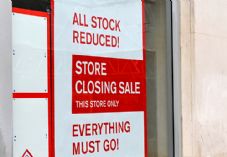UK DIY News
Pre-COVID-19, House Price Growth had Gained Momentum

The latest Nationwide House Price Index reveals that the average price of a house in the UK was £222,915 in March 2020, up from £219,583.
- Annual house price growth edges up to 3.7%, the strongest since February 2017
- Impact of pandemic will not be fully captured in this month’s data
- 0.7% rise month-on-month, after taking account of seasonal factors
Commenting on the figures, Robert Gardner, Nationwide's Chief Economist, said:
“Annual house price growth increased to 3.7% in April, up from 3% in March - the fastest pace since February 2017 (when annual growth was 4.5%). There have been month-on- month gains for the last seven months in a row, after taking account of seasonal effects.
“It’s important to note that the impact of the pandemic is not fully captured in this month’s figures. This is because our index is constructed using mortgage approval data, and there is a lag between mortgage applications being submitted and approved.
“Indeed, c80% of cases in the April sample relate to mortgage applications that commenced prior to the lockdown, and hence before the full extent of the impact of the pandemic became clear.
“In the opening months of 2020, before the pandemic struck the UK, the housing market had been steadily gathering momentum. Activity levels and price growth were edging up thanks to continued robust labour market conditions, low borrowing costs and a more stable political backdrop following the general election.
“But housing market activity is now grinding to a halt as a result of the measures implemented to control the spread of the virus, and where the government has recommended not entering into housing transactions during this period.
“Indeed, a lack of transactions will make gauging house price trends difficult in the coming months. Our ability to produce the index in the months ahead will depend on there being sufficient transactions which are representative of the wider housing market.
Where next?
“The medium-term outlook for the housing market is also highly uncertain, where much will depend on the performance of the wider economy.
“Economic activity is set to contract significantly in the near term as a direct result of the necessary measures adopted to suppress the spread of the virus.
“But the raft of policies adopted to support the economy, including to protect businesses and jobs, to support peoples’ incomes and keep borrowing costs down, should set the stage for a rebound once the shock passes, and help limit long-term damage to the economy.
“These same measures should also help ensure the impact on the housing market will ultimately be much less than would normally be associated with an economic shock of this magnitude.
Commentary
Ben Taylor, CEO of Keller Williams, the largest estate agency globally, comments:
“Whilst this Nationwide data is a snapshot that mainly represents mortgage applications made prior to lockdown, it demonstrates the underlying strength of the property market going into the pandemic.
It will, therefore, take a big reversal in demand to put annual house prices into negative territory this year.
Of course, the market’s health will, as ever, depend upon the fundamentals of employment, the cost and availability of mortgage monies and consumer sentiment.
However, with the prime minister’s announcement this week that he will soon start to set out how many of us can begin to get back to work and with the furlough scheme evidently functioning as intended, we shouldn’t expect to see any significant backward price correction in the foreseeable future."
Property expert from Moving Home Advice, Russell Quirk, commented:
“Many were looking to this index to provide a first glimpse on the pandemic’s impact on the UK property market but this hasn’t quite materialised.
Announced plans of a lockdown exit strategy will at the very least bring hope to a market that has otherwise frozen over for the large part, and many within the industry remain cautiously optimistic that some degree of heightened market activity will return in the coming months.
These latest figures themselves demonstrate the rapid return to form a beleaguered market can make after months of stale movement, with the best performance registered in over two years coming in the wake of December’s election. Rest assured while the current landscape is problematic, even the slighted return to normality will bring a notable boost in sentiment, confidence and property values.”
Founder and CEO of GetAgent.co.uk, Colby Short, commented:
“We wait with bated breath for some concrete data on the impact of Coronavirus on house prices across the UK. However, it looks as though we will have to wait a while longer, potentially until June or July when the Land Registry has processed their March and April indices based on actual transactions.
In the meantime, we do know that listings coming onto the market have all but ground to a halt and this will have an impact on price as the number of sales reduces.
The silver lining for the time being, at least, is that this remains a Government induced market freeze and not a financial one, which should see a swift return to health once the dust settles.
Of course, any financial impact may take some time to materialise on all sides and should sellers flood the market with stock they can no longer afford, prices will take far longer to recover than they would have otherwise.”
Source : Insight DIY Team and Nationwide
Image : jax10289 / Shutterstock.com (1184663653)
Insight DIY is the only source of market information that I need and they always have the latest news before anyone else.











































